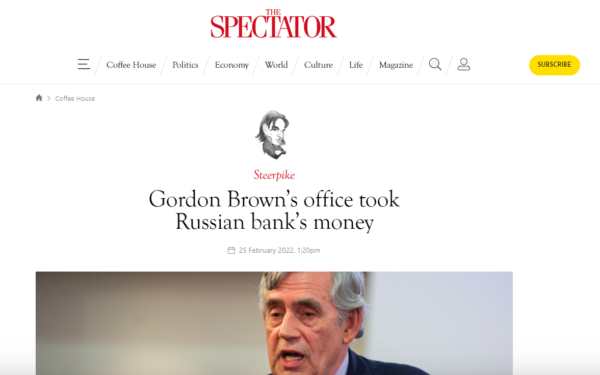Former prime minister Gordon Brown has lost an IPSO complaint against The Spectator over an article about his so-called “Russian riches”.
Brown also complained about the handling of the issue to IPSO’s independent complaints reviewer but was told the process was not flawed, with his request for a review turned down.
The article in question, written in The Spectator’s gossip column Steerpike in February, was originally headlined: “Gordon Brown’s Russian riches.”
Brown complained the article, and subsequent edits of it, contained several inaccuracies and “misleading and distorted information” as it wrongly gave the impression he had personally profited from giving a speech to a Russian bank.
But The Spectator argued it was “deeply chilling” Brown would try to force the removal of an article that was in the public interest, when the fact of the speech and its fee were not in dispute.
The first version of the article, which has since been updated, said the former Labour leader “was paid over £100,000 by a newly sanctioned Russian bank” and that he received £124,494 for a four-hour speech given to major Russian financial institution Sberbank and corporate giant Troika Diolog in 2012.
The article said the pay equated “to £500 per minute or £8 a second. Kerching!” but acknowledged he did not receive any money personally from the engagement. The fee instead went to his office to support the employment of his staff. It also said he “unsurprisingly” did not respond to a request for comment.
A day after publication, the headline was changed to “Gordon Brown’s office took Russian bank’s money” and some of the wording of the article was edited, including by taking out the words “kerching” and “unsurprisingly”.
It also deleted this sentence: “First Peter Mandelson’s strategy firm and now Gordon Brown’s Russian roubles. How many more Moscow skeletons will come out of the Labour closet?” and added more details about purpose and funding of The Office of Gordon and Sarah Brown.
A further day later the following sentence was removed: “An interesting question arises though as to which donations to politicians are legitimate and for what reason.”
A footnote to the article was also added to state: “We are happy to make it clear that Gordon Brown never personally benefited from the engagements or speeches referred to in this piece.”

IPSO acknowledged that Brown “strongly objected to the tone of the article and the language employed” but said that although parts of it could be read as implying he personally pocketed the money, each version of the story made clear he “was not receiving any money from the engagement personally”.
The regulator also said the “Russian riches” headline was not inaccurate, distorted or misleading because it referred to “the money exchanged for a speech delivered by the complainant, which was received by the office bearing his name”.
Brown had complained the original article did not include a reference to the fact he had “spoken out consistently against Mr Putin’s regime over recent years,” although a later version did add this information. But IPSO said The Spectator had a right to decide what was included as long as it did not lead to a breach of the Editors’ Code of Practice.
IPSO’s complaints committee did express concern that the journalist involved gave Brown only an hour to respond at 11pm and wrote from a university email address without explaining they were writing for The Spectator.
But the regulator said “there was no stand-alone requirement for the publication to have contacted the complainant prior to publication, or to refer specifically to previous rulings or the complainant’s office’s website, except where this was necessary to fulfil a requirement to take care” under Clause 1 (accuracy) of the Code.
Regarding the “unsurprising” failure to reply, IPSO said this choice of wording was “necessarily subjective, and that the publication was not making any claim of fact as to why the office had not responded to its requests for comment”.
IPSO concluded: “The Committee did not find that any version of the article included significant inaccuracies or misleading information in need of correction. Nevertheless, the Committee welcomed the steps the publication had taken to engage with the complainant’s concerns and provide additional clarity as to the nature of the payment.”
Read the full IPSO ruling here.
Read more summaries of IPSO rulings and legal cases on Press Gazette here.
Picture: Reuters/Simon Dawson
Email pged@pressgazette.co.uk to point out mistakes, provide story tips or send in a letter for publication on our "Letters Page" blog
